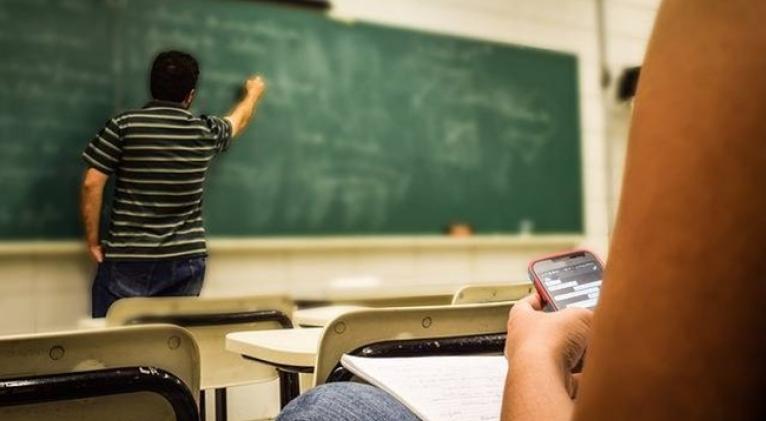Cell phones at schools, or the school in the cell phone?
especiales

The school year has just started and with it, the conflicts around cell phones.
It happens that in just a few weeks, teachers and professors have already repeated this same phrase so many times: "turn off the cell phone."
And it is not because the student was looking for information about the content that was taught in the classroom, but because he was responding to a message or simply checking social networks.
It is a phenomenon that is repeated worldwide and has led to explicit cell phones ban at some schools. Countries such as France, Italy, Belgium and the Netherlands have already prohibited the use of these devices in classrooms; while in Spain, the United Kingdom and Germany the decision is left to the educational institutions or the autonomous regions.
It is a tough and controversial decision, which requires a balance in the controlled use of cell phones in specific school activities and clear rules as well as educational programs that contribute to the responsible use of technology.
But the truth is that cell phones are a strong distraction, especially for teenagers, and conspire against focusing on class and the teaching-learning process in general.
Researches confirm it
Cell phones can seriously undermine teaching activity, focus in general, and research confirms this theory.
This is the case of the study Attention Capacity: An Innovative Way to Restore Balance, Happiness and Productivity, whose author, professor of computer science at the University of California, Gloria Mark, reveals that over the two decades she has been measuring people's attention capacity, it is increasingly smaller as cell phones take over the environment.
When the researcher began to measure such capacity, 20 years ago, those involved in the research could maintain attention for two and a half minutes. At present, they can barely remain attentive for 47 seconds.
There are several factors that can conspire against the ability to pay attention -which is usually accompanied by hyperactivity- but in the case of the technologies that concern us, researchers confirm that it is a kind of epidemic that threatens focus, and, therefore, also learning, teaching performance and even interpersonal relationships, leading to a social problem.
This is the opinion of, for example, Spanish clinical psychologist and professor José R. Ubieto, who states that "The hijacking of our focus affects everyone. We are reading less, losing direct communication skills and disregarding the creative thinking that arises from boredom."
Attention deficit disorder, understood in this case as a disorder, affects almost 10% of children in the United States and between 5 and 7% of Spanish children and adolescents, according to a National Geographic publication, "there is a growing scientific support that links learning disorders, specifically attention-deficit/ hyperactivity disorder, with the excessive use of technology is unquestionable."
What do Cuban scientists say?
The article The integration of mobile devices in the educational field, published in the middle of last year in the digital magazine Pedagogía Profesional, from the Enrique José Varona University of Pedagogical Sciences, states that "It is a reality and a challenge for teachers that mobile devices have come to the classrooms to stay. Some teachers consider it an opportunity, with an educational potential that must be taken advantage of while others consider them distractions."
Regarding this dilemma, Dr. Georgina Díaz Fernández and Master Yoan Picasso Boucourt, both from the Havana’s Pedagogical University and authors of the aforementioned research paper, refer that this new scenario "implies that the role of teachers and educational institutions has to adapt to this new environment."
They recognize that there are handicaps that undermine this question and among them, they mention the lack of efficient use of mobile devices as means of the teaching-learning process, as well as the lack of knowledge of the collateral effects that their use may trigger.
Among the advantages of using mobile devices in the classroom, both point out the possibility of accessing information from any place and at any time, expanding the classroom beyond the educational institution; using educational Apps as teaching-learning media, in addition to allowing the production of content. It favors personalized learning contributing to the autonomy of students and, at the same time, increases the motivation of students to make these technologies part of their daily reality.
In the article, they mention some of the benefits that they have found from the use of this technology when integrating it into the teaching process, and among them they mention that it allows students to share information from classes and access the teaching website. It makes it easier to review and send messages through social networks and email to respond to teachers' assignments and also to take photos and videos of classes or research works.
On the other side, both comments on some of the inappropriate uses that are given to mobile devices in class: listening to music or watching videos, checking or updating their social network profiles, taking selfies, playing games, exchanging information and surfing the Internet without purposes linked to the class.
These "distractions," while the teacher tries to give the best of himself or herself in front of the blackboard, are not a secret. But it is less known, and above all less internalized, the need for students to become increasingly more responsible by developing autonomous and self-regulated learning, for which educators have much to contribute.
However, the article itself refers to some of the reasons why teachers do not rely on students' mobile devices in their classes: they lack technological skills for it. They do not know how to use these devices as teaching-learning aids in class, they consider these mobiles to be a source of distraction. They do not have a mobile device or they suffer from technophobia (fear of using new technologies or devices due to lack of knowledge of how to use them).
Despite the undeniable advantages of using these mobiles for education, the authors insist that there is still doubt about whether or not to prohibit them in the classroom and in response to this they mention the need to implement regulations and parameters for their use in class, which must consider, among others, matters related to computer security, health and the environment, to avoid collateral effects including possible accidental or voluntary access to harmful or inappropriate content, and also the risk of publishing unauthorized personal information that compromises the integrity of others.
In conclusion, they propose that "the use of mobile devices in education is a reality that must be settled on in its correct use within the teaching-learning process, with the goal of raising the quality and contributing to the updating of the educational system.
"An alternative for this to materialize is the improvement and methodological training of teachers regarding the use of mobile devices in the educational field and the development of the necessary skills for their correct use."
The Ministry of Education itself assures on its website that "Without new technologies there is no school" and that the computerization of its educational institutions is a priority for comprehensive and quality training. However, there is still a long way to go, based on a survey with students and teachers carried out by Juventud Rebelde newspaper.
Translated by Sergio A. Paneque Díaz / CubaSí Translation Staff














Add new comment